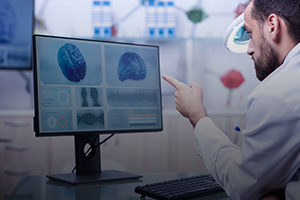Lab-Grown Mini-Brains

Organoids are miniature versions of human organs that are grown under strict laboratory conditions. While they are not fully functional, they are useful for modeling diseases and tracking any structural changes that may occur as a result of drugs and/or gene therapy. Organoids are grown by harvesting cells from adult skin or blood, reprogramming them into stem cells, and placing them into a “cocktail” of molecules that turn specific gene factors on and off to regulate their development.
Recently, a team of researchers used this process to grow cortical neurons – cells from the part of the brain that controls thought and behavior. They also further refined the growth cocktail to allow the mini-brains to develop for longer periods of time. After two months, using tiny electrodes that measure brain activity, they detected scattered wave as might be seen in an immature human brain. After nine months, the electrical impulses were analyzed using a machine learning algorithm that had been trained on data from premature infants. The algorithm could not distinguish brain activity in the mini-brains from that of preemies.
The clinical implications of this research could be far-reaching for studying disorders of neural circuitry, such as autism, epilepsy, and schizophrenia. Eventually, organoids may even be able to replace areas of damaged tissue in the brain.
For information: Alysson Muotri, University of California-San Diego, Sanford Consortium, 2880 Torrey Pines Scenic Drive, La Jolla, CA 92037; phone: 858-534-9320; fax: 858-246-1579; email: muotri@ucsd.edu; Web site: https://ucsd.edu/index.html